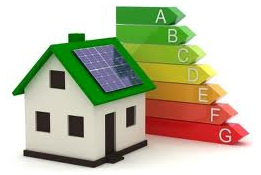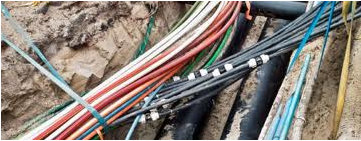 The sceneario follow “The Covenant of Mayors” movement to increase energy efficiency and use of renewable energy sources on their territories (> 4.000 signatories for over 160 Mln people)
The sceneario follow “The Covenant of Mayors” movement to increase energy efficiency and use of renewable energy sources on their territories (> 4.000 signatories for over 160 Mln people)- Sustainable Energy Action Plan (SEAP) → CO2 reduction target by 2020
- Unrelated information: buildings, environmental info,planning and
infrastructure
Green Energy scenario
Pilot cases
The objectives of the GeoSmartCity Green Energy scenario are:
- to develop services to count the buildings energy savings (i.e. defining of model and services to monitor and analyze solar irradiation and other factors influencing energy production and consumption);
- to make available services to support the smart energy use for each stakeholder;
- to support public administrations and local authorities to define and adopt policy in order to identify the best use and the reduction of fossil fuels, and to increase local job opportunities adopting energy transition plans involving public and private players.
The Virtual Hub will provide a re-usable cross-platform toolkit and methodology for the integration of open (geo)data using international standards (i.e. linked data, INSPIRE, Sensor data, GNSS). The integration of different set of geo data and energy data will create a new whole point of view of energy use, policies, strategies in the smart energy sector at all level: local, national and international, and promote the use and re-use of open (geo)data and related services. The Virtual Hub data and services will enable new opportunities for SMEs in different market sectors: building, energy (production, distribution, trading), transportation (public and private), marketing, ICT (hardware, sensors, information technologies) contributing to the creation of new jobs opportunities.
SMEs of “energy sector”
- use the GeoSmartCity Hub services to analyze the opportunities and return on investment of buildings energy retrofit and home renewable energy plants;
- develop and implement new services “open geodata based” according to the PSI.
Utilities energy producer, broker and vendor
- publish dataset about energy consumption;
- promote own energy services and marketing initiatives;
- take advantage of the integrated (geo)data describing the local energy scenario
Public Administrations, Local Authorities, Authority and Agencies
They will be involved and will gain benefits by:
- building smart cities, smart energy and open data initiatives (planning, developing, monitoring and feedback adjustment) based on the GeoSmartCity hub;
- publishing and sharing basic and official dataset in the platform (i.e. office, roads, civic number, buildings, urban plans) in order to build a common a shared energy knowledge base;
- using GeoSmartCity Hub data and services to improve the process of policy making (and monitoring) based on up to date, official and integrated data;
- supporting local SMEs to increase new job opportunities driving and promoting skill development and business strategies in order to take advantage from the energy transition strategy;
- granting the GeoSmartCity Hub market neutrality in order to promote private data collection;
- defining rules, policies and processes to ensure data availability and quality;
- advertising programme, calls for funding, call for proposals, and all interesting information about smart energy and open data initiative
Building designer, urban and energy planner
- take advantage of the integrated (geo)data describing the local energy scenario, and specific data (from city areas to single building) definitely reducing time and costs of designing and planning;
- expect good quality, updated and certified data and then market valuable data thanks to GeoSmartCity Hub services, policies and processes.
University, Research Center, training institutions
- Successful open data and smart energy projects needs new or improved skills to support the different players involved. University and research center have a key role in this challenge planning thematic courses in geographic information, technologies, business administration, legal, etc.
Citizens and consumer
- use specific information about own buildings (construction characteristics, energy consumption, etc.) in order to evaluate investment on retrofit and energy savings;
- share data about family and building energy consumption and life style (i.e. by smart metering);
- view the state of territory, how it will change in the future;
- join in e-democracy and e-participation initiatives, policy making, etc.;
- compare and evaluate energy services in the market;
- share experiences in the use of green and sustainable energy, buildings, etc.
Underground scenario
Pilot cases
Underground management is a key aspect for gaining efficiency in the cities avoiding public works duplication and citizen’s annoyance. Specialised services will be designed based on requirements specified for underground scenario and identified by related pilots. The benefits will be:
- Instant access to updated data, to speed up the planning process, the development and the control of works
- Integration of underground data with territorial data to search for papelines located in risk zones (hydrogeologic, hydraulic, sysmic…) and that need a specific monitoring
- Availability of Apps and Augmented Reality in the daily management of utility networks and to optimize emergecy interventions
- Involvement of citizens which are asked to signal, through their smartphones, possible failures of the utility networks (crowd-sourcing)
The advantages derived by the implementation of the Underground Scenario are:
- data sharing and accessibility, for a rational organization and schedule of maintenance (and less costs and troubles to citizens);
- real-time information, for a prompt and safer intervention in case of accident or damage;
- information sharing, with the possibility of planning concurrent and co-ordinate intervention for renewal, extension or upgrade of a network.
Civil Protection and Environmental Agencies
In case of emergency (failures, breaks) they can have at their disposal real-time and harmonized information on the underground and the surrounding environment, to better plan the interventions and minimize in such a way damages to human life, environment, fauna and flora.
Utility companies (gas, water, energy, telecom)
They are the owner of utility networks and related data, who can benefit from the project having an improved flow of information towards and from the PA, and additional information and tools useful for the management of their assets.
Citizens
They will benefit from the GeoSmartCity in terms of less inconveniences due to a more rational and harmonized management of underground (less traffic, less digs) and also in terms of their participation into the process – thanks to an App they can in fact be informed about the underground (ordinary management, emergency) and related behaviour to be followed, as well as the citizens can help the network managers by signalling his observations (failures, gas escape, etc.).
Territorial companies
They can use the sharing of knowledge on the underground to better plan their interventions into a more harmonized and collaborative way, minimizing in such a way impacts on the traffic an on citizens.
Municipalities and other Public Administrations
They owning open data and in charge of the digitalization and rationalization of underground information.

